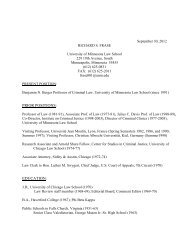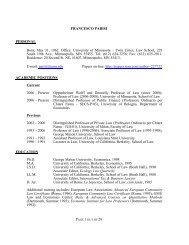Enabling Private Ordering - the University of Minnesota Law School
Enabling Private Ordering - the University of Minnesota Law School
Enabling Private Ordering - the University of Minnesota Law School
You also want an ePaper? Increase the reach of your titles
YUMPU automatically turns print PDFs into web optimized ePapers that Google loves.
54 MINNESOTA JOURNAL OF INT’L LAW [Vol. 18:1<br />
would shield contract claims from treaty-based dispute<br />
settlement.<br />
In sum, <strong>the</strong>re is sufficient State practice to support <strong>the</strong><br />
conclusion that, in principle, customary international law did<br />
and does not prevent States from espousing <strong>the</strong> claim for breach<br />
<strong>of</strong> contract by one <strong>of</strong> its nationals against <strong>the</strong> host State<br />
independent <strong>of</strong> <strong>the</strong> existence <strong>of</strong> an independent breach <strong>of</strong><br />
international law. Consequently, <strong>the</strong>re is no room for a<br />
presumption <strong>of</strong> interpreting investment treaties, including<br />
umbrella clauses, restrictively so as to uphold <strong>the</strong> allegedly<br />
strict distinction between contract claims and treaty claims.<br />
Such a presumption finds no basis in State practice or<br />
international jurisprudence. Instead, <strong>the</strong> history <strong>of</strong> contract<br />
claims in international dispute settlement fora as well as <strong>the</strong><br />
inclusion <strong>of</strong> broadly worded arbitration clauses in modern<br />
investment treaties illustrate that <strong>the</strong> main problem in <strong>the</strong><br />
protection <strong>of</strong> investor-State contracts was more caused by <strong>the</strong><br />
lack <strong>of</strong> ready dispute settlement mechanisms for contract claims<br />
than by any firm and dogmatic distinction between claims based<br />
on international and those based on national law. 147<br />
C. THE HISTORICAL PERSPECTIVE ON UMBRELLA CLAUSES<br />
That <strong>the</strong> function <strong>of</strong> umbrella clauses is to establish<br />
enforcement mechanisms for host State promises, independent<br />
<strong>of</strong> whe<strong>the</strong>r a breach was <strong>of</strong> commercial or sovereign character, is<br />
also supported by <strong>the</strong> historical background <strong>of</strong> <strong>the</strong> emergence <strong>of</strong><br />
umbrella clauses. 148 Arguably <strong>the</strong> first umbrella clause was<br />
included in an Agreement between <strong>the</strong> United Kingdom and<br />
Peru from 1921 that created an ad hoc tribunal for <strong>the</strong><br />
resolution <strong>of</strong> a dispute over a mineral concession granted to a<br />
British-owned company. The object <strong>of</strong> this agreement was not to<br />
change <strong>the</strong> applicable law <strong>of</strong> <strong>the</strong> concession but to “elevate <strong>the</strong><br />
status <strong>of</strong> <strong>the</strong> resulting award from that <strong>of</strong> an award simply<br />
147. Cf. Jennings, supra note 58, at 165 (arguing that <strong>the</strong> view denying any<br />
genuine protection to State contracts by international law largely stems from a<br />
misperception about <strong>the</strong> relationship between substantive and procedural law. It<br />
thus “fall[s] into <strong>the</strong> error <strong>of</strong> erecting <strong>the</strong> absence <strong>of</strong> a remedy into a dogma, and<br />
suppos[es] that where no remedy is, none could be. This easily ripens into <strong>the</strong> error<br />
<strong>of</strong> continuing to suppose that no remedy can exist even where one is already<br />
provided.”).<br />
148. For more information on this and <strong>the</strong> following, see Sinclair, supra note 2,<br />
at 412–13, which provides an excellent study on <strong>the</strong> historical development <strong>of</strong><br />
umbrella clauses.
















